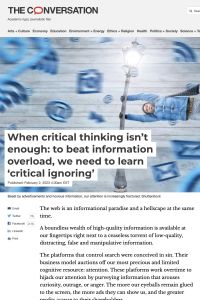Join getAbstract to access the summary!

Join getAbstract to access the summary!
Ralph Hertwig, Anastasia Kozyreva, Sam Wineburg and Stephan Lewandowsky
When Critical Thinking Isn’t Enough: To Beat Information Overload, We Need to Learn “Critical Ignoring”
Beset by advertisements and noxious information, our attention is increasingly fractured.
The Conversation, 2023
What's inside?
To cope with information overload, learn “critical ignoring.”
Recommendation
Everyone knows search engine algorithms shunt you to incendiary or prurient sites to increase their ad revenue, yet that strategy remains remarkably effective. The tsunami of information, disinformation and misinformation online can overwhelm you. You may need new strategies to discern which sources are worth your time. Writing in The Conversation, a philosopher, two cognitive scientists and an educational scientist – Ralph Hertwig, Anastasia Kozyreva, Sam Wineburg and Stephan Lewandowsky – propose that web users apply “critical ignoring” as much as critical thinking. If you actively choose what to ignore, they insist, you’ll retain more bandwidth to attend to and savor more meaningful material.
Summary
About the Authors
Ralph Hertwig is the Director of the Center for Adaptive Rationality at the Max Planck Institute for Human Development, where Anastasia Kozyreva is a cognitive scientist. Sam Wineburg is a Professor of Education and (by courtesy) History at Stanford University. Stephan Lewandowsky is the Chair of Cognitive Psychology at the University of Bristol.



















Comment on this summary